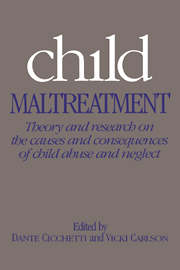Book contents
- Frontmatter
- Contents
- List of contributors
- Preface
- Part I History and definition
- Part II Parental and contextual influences on maltreatment
- 6 Lessons from child abuse: the determinants of parenting
- 7 The antecedents of maltreatment: results of the Mother–Child Interaction Research Project
- 8 Parental attributions as moderators of affective communication to children at risk for physical abuse
- 9 Perceived similarities and disagreements about childrearing practices in abusive and nonabusive families: intergenerational and concurrent family processes
- 10 Cognitive foundations for parental care
- 11 Intergenerational continuities and discontinuities in serious parenting difficulties
- 12 The construct of empathy and the phenomenon of physical maltreatment of children
- Part III The developmental consequences of child maltreatment
- Name index
- Subject index
10 - Cognitive foundations for parental care
Published online by Cambridge University Press: 04 May 2010
- Frontmatter
- Contents
- List of contributors
- Preface
- Part I History and definition
- Part II Parental and contextual influences on maltreatment
- 6 Lessons from child abuse: the determinants of parenting
- 7 The antecedents of maltreatment: results of the Mother–Child Interaction Research Project
- 8 Parental attributions as moderators of affective communication to children at risk for physical abuse
- 9 Perceived similarities and disagreements about childrearing practices in abusive and nonabusive families: intergenerational and concurrent family processes
- 10 Cognitive foundations for parental care
- 11 Intergenerational continuities and discontinuities in serious parenting difficulties
- 12 The construct of empathy and the phenomenon of physical maltreatment of children
- Part III The developmental consequences of child maltreatment
- Name index
- Subject index
Summary
What is parental development, and how is parenthood defined? Is it a biologically based instinct, or a set of behaviors and/or skills learned at a parent's own mother's (and father's) knee? Is the development of parental competence largely a psychological process, or is it a reflection of the capacity of the environment to support or erode the establishment and maintenance of a nurturant home context?
Parental development has been variously defined, and the definitions attached to parenting have had important implications for our understanding of the breakdown in parental functioning represented by child maltreatment. For example, researchers who conceptualize parental development as the acquisition of a set of traits or abilities may fail to examine characteristics of the environment or characteristics of the child in order to explain adequately why some parents sharing certain psychological attributes may abuse a child in their care and others may not. Clinicians who focus exclusively on parental psychological variables may place a child in foster care without recognizing that there is a strong and caring extended family where the child could be placed with a minimum of trauma until the parent's emotional issues can be addressed.
We define parenting as a complex and multidimensional process.
- Type
- Chapter
- Information
- Child MaltreatmentTheory and Research on the Causes and Consequences of Child Abuse and Neglect, pp. 302 - 316Publisher: Cambridge University PressPrint publication year: 1989
- 10
- Cited by



